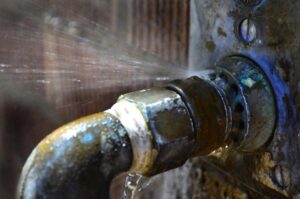
When talking about potential plumbing problems, perhaps none strike fear into a homeowner’s heart quite like a slab leak. These below-ground pipe leaks, which occur in the foundation of your home, can go undetected for months, wreaking havoc on your property and potentially undermining the structural integrity. In this guide, we explore what slab leaks are, how to recognize their presence, the dangers they pose, and the crucial need to hire a professional plumber to deal with them effectively.
Understanding Slab Leaks: The Hidden Menace
To understand how a slab leak becomes such a significant issue, let’s break down the basics. A slab leak occurs when a water line under the foundation of your home springs a leak. This can be the result of a variety of factors—corrosion, abrasion from gravel, shifting soil, low-quality installation, or even the natural settling of your home over time. Since the pipes are concealed below thousands of pounds of concrete, finding and fixing these leaks requires specialized detection and repair skills.
Understanding the components and conditions that contribute to slab leaks is the first step in protecting your home. Many of these pipes are made of copper, a material typically highly resistant to corrosion—however, certain water compositions can cause the copper to erode over time. This is why it’s crucial to have a baseline understanding of your home’s plumbing materials, as well as regular water quality checks from a professional.
Spotting the Subtle Signs of Slab Leaks
The sneakiness of slab leaks lies in their hiding places, which means the signs can go unnoticed until the issue has escalated. Here are the subtle indicators that you might have a slab leak:
- Sudden Spike in Water Bills: One of the first signs might be an unexplained increase in your water usage or costs.
- Sounds of Running Water: If you hear water running when all fixtures are off, this is a clear sign of an interior leak, potentially under the slab.
- Warm Spots on Floors: Leaks from hot water lines can cause temperature differentials in your flooring.
- Mildew or Moisture under Carpets: This can indicate that water is pooling, leading to the growth of mold and mildew.
Each of these clues, on its own, might not suggest you have a slab leak. However, if you spot more than one of these issues, it’s time to investigate further.
The Dangers of Ignoring Slab Leaks
Left unattended, a slab leak can lead to a host of problems that extend beyond just water damage. These include:
- Mold and Mildew: A breeding ground for allergens and toxins in the home.
- Foundation and Structure Damage: Over time, water intrusion can compromise the integrity of your home’s foundation.
- Pest Infestations: Extended exposure to damp conditions attracts insects that flourish in moist environments.
- Health Concerns: Dampness in the home can lead to respiratory issues and allergies, especially in young children and the elderly.
- Devaluation of Property: The existence of slab leaks and the subsequent effects can significantly reduce the resale value of your home.
Clearly, the potential risks associated with slab leaks are not to be trifled with, and swift action is paramount to mitigating damage.
Why a Professional Plumber Is Non-Negotiable
The intricate nature of slab leak repairs makes DIY a risky choice. As tempting as it might be to save a few bucks and attempt to fix a slab leak yourself, the risk of causing more extensive damage is high. Trust the professionals, and you’ll save time, money, and your home’s integrity.
In conclusion, while slab leaks can be alarming, they are not unbeatable. Armed with the right knowledge and the proper professionals, you can fortify your home against these hidden water wasters. Don’t wait until it’s too late—keep a keen eye out for the signs, and when in doubt, bring in a professional to assess the situation. Your home, health, and wallet will be better off for it. Contact Spartan Plumbing Inc. if you suspect you may have a slab leak.
